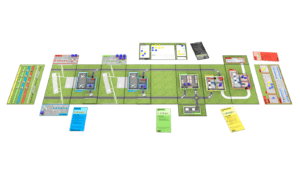Hello, do you want to play a (supply chain) game?

The demand for board games has been skyrocketing in the Netherlands for a while now. Even before covid-19, we saw an already increasing interest. Now with limited alternative leisure activities available, due to lockdown restriction, we notice an even sharper incline. Dutch games publishers have been measuring a revenue growth of 60 – 80%. So clearly we love playing a good boardgame with friends and family to have an enjoyable time.
Wouldn’t it be great if we could translate this success into our business offices? Of course, this has already been happening for over twenty years in the form of serious games. Serious games have a purpose other than solely entertainment. They are used to educate and stimulate behavioural change. The interest for serious games has been increasing steadily and the market value is expected to further increase by 180% over the next 10 years.

The benefits of serious gaming
- Serious games have multiple advantages that will benefit your learning/training:
- Put knowledge and/or skills into practice: give an opportunity to put the lessons learned into practice and therefore minimizing the forgetting curve?
- Engage and inspire: beating your colleagues or unlocking a reward might just give that extra encouragement.
- Simplify complex tasks: allow employees to explore every aspect of a task in a fun and interactive way.
- Build problem solving skills: real-world challenges cannot always be solved by a certain trick. Gain the ability to see things from a different point of view and act accordingly.
The Service Supply Chain Game
During our most recent spare parts management training for the Royal Dutch Airforce, we incorporated the “Service Supply Chain Game” – a serious game, co-developed by Gordian – into the training program. The SSC Game simulates a service supply chain which supports the maintenance of capital goods or assets. Multiple roles in the supply chain (e.g. asset owner, logistics provider, maintenance manager and supplier) have to collaborate in order for them to be profitable. The attendees will each play their own role and gather insights in the supply chain dynamics and the influence of conflicting interests towards the overall supply chain performance. This game offers the most added value to (service) supply chain professionals from all disciplines and students in the field of (service) logistics, asset management and maintenance.

Where our spare parts management training is of a quite theoretical nature, teaching subjects such as statistics, demand forecasting and inventory control, the SSC Game offers a playful way of putting these learned topics into practice. The most important goals for the game are:
- Create insight into the overall dynamics of the service supply chain.
- Experiment with collaborating in the supply chain: create insight in the impact of not providing the right information (on time) in the supply chain, both upstream and downstream.
- Experiment with supply chain innovations: discover the impact of innovative ideas on supply chain design and performance.
As a teacher, or game instructor, I really enjoy the true nature that emerges from the players of the SSC Game. When reading the anecdotes below, keep in mind that this game is aimed at communication and collaboration. These are situations that we often see during the first session of the game.
- Asset owner: “Ah, during this round we are supposed to execute mayor maintenance work. By the way, you (logistic manager) should probably already have increased your stock.”
- Procurement: “You (the supplier) promised my order this round, now we are in deep trouble. It’s game on! Can we charge him a fine please?”
- Team: “We have been very fortunate with our failures so far in this game (which are determined by rolling the dice), we can probably lower our stock levels a bit to reduce our costs and increase our profit.”
Besides the game being educational, insightful and funny, it proves that it is a very good way to put the different disciplines of your service supply chain in the same (digital) room. They are then forced to put themselves in each other’s shoes to experience the conflicting interests and to look at decision-making from a different perspective. This is a very good starting point for more connection and mutual understanding; the foundation for a successful collaboration.

source: http://superbcommunication.com/25-quotes-to-inspire-superb-communication/


